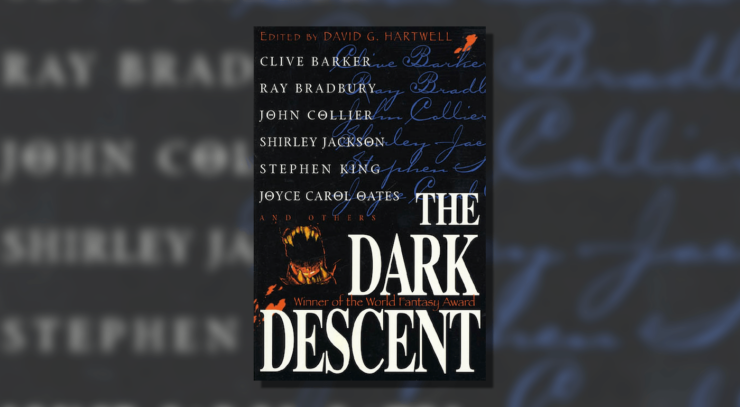Welcome back to Dissecting The Dark Descent, where we lovingly delve into the guts of David Hartwell’s seminal 1987 anthology story by story, and in the process, explore the underpinnings of a genre we all love. For an in-depth introduction, here’s the intro post.
Joseph Sheridan Le Fanu is a name that looms large in the gothic landscape. Perhaps most famous for his novella Carmilla (featured alongside “Mr. Justice Harbottle” in the collection In a Glass Darkly), which codified and popularized the lesbian vampire in fiction, he’s also deeply influential to a number of writers we’ve covered in this column— M.R. James edited a collection of Le Fanu’s ghost stories, H.P. Lovecraft name-checked him in “Supernatural Horror,” and Hartwell considers him in the same class as Poe in terms of mastery of gothic fiction and social commentary.
“Mr. Justice Harbottle” finds Le Fanu wielding this mastery in a gothic and grotesque story of an evil magistrate meeting his end by possibly divine retribution. While it certainly seems like a straightforward example of a Gothic morality tale, within its twisted and shadowy confines lie a discussion of justice and power wielded against those less privileged, and a commentary on the horrid food chain designed by oppressive systems of power.
Justice Elijah Harbottle is a man of petty and vindictive strength, a hanging judge who manipulates the law and abuses the system to his benefit. Known as “the wickedest man in England,” he rules his small court with an iron fist and bullies everyone until they fall in line with his desires. Until, that is, a strange old man brings him a worrying bit of news about Lewis Pyneweck (a forger the judge decided to hang in order to erase his own scandal) and the promise of oversight from a higher council of judges. While it’s quickly revealed to be a hoax, this relatively small worry kicks off a downward spiral in Harbottle’s life, drowning him in a sea of paranoid hallucinations, odd nightmares, and assaults from a variety of apparitions dredged up from his guilty past. For while Mr. Justice Harbottle might have escaped earthly justice, he is still judged guilty by powers ready to render their own verdict and sentence.
There’s a twisted sense of justice to “Mr. Justice Harbottle,” in that the exact crime that results in Harbottle being tormented by spirits is the only one of his misdeeds that we see to be driven by personal motives. While most of his crimes are against people for purely petty reasons, Pyneweck is the only victim (within the confines of Le Fanu’s work) that he has any personal connection to, having ruined the man’s life with scandal and possibly stolen his wife away when they lived in the same town. Harbottle abuses his power to hang a man for a minimal offense, calling it a “morsel,” having personally ruined the same man’s life. The judge himself admits that “he had done this grocer, forger, whatever a grievous wrong some five or six years ago,” though he feels absolutely no remorse for condemning to death someone who doesn’t deserve to die. Similarly, while Harbottle deserves to face earthly justice, he’s condemned by Pyneweck and his grotesque retinue of wronged spirits, hanged by them, and doomed to wander his house, following them as a restless spirit himself. Not only is he tormented into the grave, he then must spend eternity with the man who put him there.
Pyneweck isn’t completely innocent, though. He was a petty tyrant to his wife (the scandal that drove Pyneweck and his wife apart involved him “ill-treating his wife,” though the details and phrasing are ambiguous and the judge definitely seems to have “helped” to some degree), to the point that she tells her seven-year-old daughter that her father died before she was born and uses her maiden name in the Judge’s house. While she does appeal on Pyneweck’s behalf, she also doesn’t think too highly of him, not bothering to send him the money for a lawyer. None of the people we meet in the story are particularly “good,” barring maybe Mrs. Carwell (formerly Mrs. Pyneweck), who argues for mercy on her ex-husband Pyneweck’s behalf. Harbottle is a grotesque figure and benefits immensely from a “pharisaical, bloody, and heinous system of justice,” fearing an internal investigation into his habit of murdering people over petty grudges. Meanwhile, the supernatural occurrences and nightmares around the judge border on sadistic and torturous. There’s a shadowy sense of moral ambiguity to the proceedings, one that matches the shadowy and supernatural fate of Justice Harbottle.
In fact, it’s telling that the people with the least agency in the story are Mrs. Carwell and her daughter— the judge treats his housekeeper as a prize he stole away from her husband, her husband abuses her and then asks her to send him cash for a lawyer, and later Pyneweck’s ghost and his demonic hangman torment the two of them along with the rest of the household staff, frightening his daughter in one instance and forcing Mrs. Carwell to endure a terrifying encounter with the ghastly hangman on the stair. The story itself doesn’t treat the mother and daughter as an afterthought, but in the case of the judge they’re reduced to trophies he won by making the bad situation between Pyneweck and his wife all the worse, and in the case of Pyneweck, they’re simply collateral damage to his demonic acts of vengeance when he decides to drag the judge to Hell. While Carwell and her daughter are central to the events of the plot (and are even given a mention in the framing device, as the stories of In A Glass Darkly are all supposedly accounts from the papers of an occult detective), ultimately the men in their lives see them as nothing more than objects onto which they can project their desire for petty manipulation and revenge.
Buy the Book


Knock Knock Open Wide
Le Fanu recasts the classic Gothic morality tale in a more complex light, one of vile men abusing their power and not caring who gets caught up in the aftermath— Pyneweck abuses his wife, Harbottle abuses his power over the legal system to first destroy Pyneweck through scandal and then see him hanged, and the spirits and demons from beyond the realm of the living then abuse their power over Harbottle in turn, hanging him in his bedroom. There are no heroes in this situation, just a long and terrible food chain built around robbing others of their agency and disposing of them, then being robbed and disposed of in turn.
If Ellison’s “The Whimper of Whipped Dogs” was about what happens when someone struggles beneath a horrific system until they finally snap and accept it, “Mr. Justice Harbottle” is about those who thrive atop that same system, abusing it gleefully and freely treating it as their own personal fiefdom until they’re forced to answer to a higher power. It’s a story unconcerned with whether or not people follow the rules, and more with those that either find ways within the rules to enact their own putrid schemes, or alternately make the rules so that they can profit—taking the “evil aristocrat” trope found in so many Gothic works to its logical conclusion by showing the reader a man who found ways to abuse the system and then showing his protracted and gruesome end as punishment for doing so. In his nightmarish and grotesque exploration of systems of power, Le Fanu questions what “justice” and “morality” mean in a world where such definitions aren’t cut and dried, and in the process delivers his own unique spin on familiar gothic tropes.
And now to throw it over to you. What’s your favorite work of Le Fanu? And is “Mr. Justice Harbottle” more straightforward than it seems?
Please join us in two weeks as we tackle another twisted tale of the tyranny of the masses with “The Crowd” by Ray Bradbury.
Sam Reader is a literary critic and book reviewer currently haunting the northeast United States. Apart from here at Tor.com, their writing can be found archived at The Barnes and Noble Science Fiction and Fantasy Book Blog and Tor Nightfire, and live at Ginger Nuts of Horror, GamerJournalist, and their personal site, strangelibrary.com. In their spare time, they drink way too much coffee, hoard secondhand books, and try not to upset people too much.










